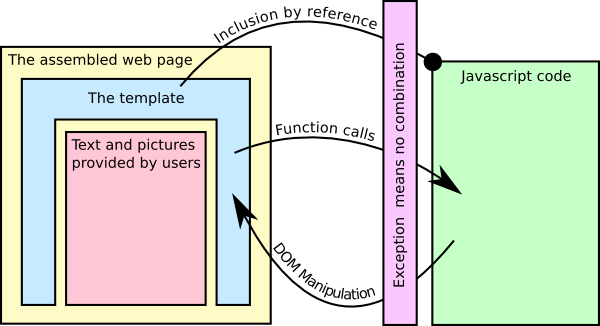When searching for "gpl javascript" in Google, I currently find these five first results:
A piece by RMS warning about how we are using more and more web apps and that we should care whether these apps are free software as much as we care whether our "traditional" software are free software.
A question on Stack Overflow (No 1239470) regarding the consequences of using a GPL'd library on one's website. Unfortunately this question was closed as off topic and all the answers which were given at that time are pretty bad. In particular, the first answer is horrible but it still has 13 upvotes (after my own downvote). This is pretty sad given that the question was viewed 12645 times. I am not linking to the question to avoid giving it more pagerank that it already has.
EDIT: Can I encourage anyone who has the privilege to downvote on SO to downvote this answer as well? I know I shouldn't be asking this, but I feel that it needs some action from people who know better. It is now the first result that appears when searching for "gpl javascript".
A similar question on Programmers SE with a more reasonable answer.
A short blog piece https://hroy.eu/posts/gpl-js-bs/ which explains clearly that using a single GPL'd component on a website does not require open sourcing the whole website. But if you build your web app on top of some GPL'd component then the whole web app should be GPL'd as well.
A very good FAQ http://greendrake.info/content/nfy0, which is quite recent (Sep 2015) and which I recommend, anwsering most questions that people may have on using GPL'd client-side code.
Additionally, this site has a few questions on some of these aspects as well. Examples:
I feel that this site should have its own general question on the implications of licensing a JavaScript library under GPL, to dedramatize further, but also to clarify what is well understood so far and what is not.
So here is a list of sub-questions (some which are already addressed in the references I gave, some which are not):
If I use a GPL'd component on my website, is the content of the website affected?
If I use a GPL'd component on my website, is the design (CSS) of the website affected?
If I use a GPL'd component on my website, are other JS components affected (if each of the component is loaded in a different
<script>tag)?If I use a GPL'd component on my website, are other JS components affected (if all the components are loaded from the same main JS file)?
If I build a web app and it uses a GPL'd component/library, does it mean that the full web app should be released under GPL (at least the client-side part of it)?
Is the design (CSS) of the web app also affected then?
I am aware that not all of these sub-questions have necessarily a well-defined answer. Feel free to answer even only partially to the ones you feel comfortable answering.
